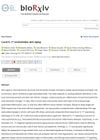 2 citations,
August 2023 in “Marine drugs”
2 citations,
August 2023 in “Marine drugs” Collagen from tilapia scales may improve hair and skin health by reducing stress and inflammation and encouraging hair growth.
 June 2022 in “Frontiers in Immunology”
June 2022 in “Frontiers in Immunology” Tofacitinib regrew hair in a man with total hair loss but raised cytokine levels, needing more research on possible side effects.
 127 citations,
January 2013 in “PLOS ONE”
127 citations,
January 2013 in “PLOS ONE” Probiotic bacteria improved skin and hair health in aged mice.
 48 citations,
July 2019 in “International Journal of Biological Macromolecules”
48 citations,
July 2019 in “International Journal of Biological Macromolecules” A new hydrogel with stem cells from human umbilical cords improves skin wound healing and reduces inflammation.
 35 citations,
January 2017 in “Journal of Dermatological Science”
35 citations,
January 2017 in “Journal of Dermatological Science” Stress can cause early aging in certain skin cells, leading to problems with hair growth.
 20 citations,
November 2019 in “Current Opinion in Systems Biology”
20 citations,
November 2019 in “Current Opinion in Systems Biology” The document concludes that computational models are useful for understanding immune responses and could improve cancer immunotherapy.
 6 citations,
January 2023 in “npj regenerative medicine”
6 citations,
January 2023 in “npj regenerative medicine” Transplanting growing hair follicles into scars can help regenerate and improve scar tissue.
 4 citations,
March 2018 in “Daehan han'yi hag'hoeji/Journal of Korean medicine”
4 citations,
March 2018 in “Daehan han'yi hag'hoeji/Journal of Korean medicine” Astragalus membranaceus helps regrow hair and reduce hair loss symptoms.
 1 citations,
January 2022 in “bioRxiv (Cold Spring Harbor Laboratory)”
1 citations,
January 2022 in “bioRxiv (Cold Spring Harbor Laboratory)” Blocking IL-17 signaling can delay skin aging and improve skin and hair health.
 February 2024 in “Journal of Education, Health and Sport”
February 2024 in “Journal of Education, Health and Sport” Different treatments for PCOS should be tailored to the individual, including lifestyle changes and various medications.
December 2020 in “The journal of investigative dermatology/Journal of investigative dermatology” Papulopustular rosacea is an inflammatory skin condition treatable with lifestyle changes and medications.
December 2017 in “Annales de dermatologie et de vénéréologie” In 2017, pediatric dermatology advanced with new treatments and insights into various skin conditions in children.
 June 2024 in “Journal of Allergy and Clinical Immunology”
June 2024 in “Journal of Allergy and Clinical Immunology” TSLP affects atopic dermatitis by increasing sebum and reducing fat through IL-4/IL-13 signaling.
September 2016 in “Journal of Dermatological Science” Hair follicles produce IL-7, which is essential for certain skin lymphoma cells to survive.
 39 citations,
January 2015 in “International journal for parasitology/International Journal for Parasitology”
39 citations,
January 2015 in “International journal for parasitology/International Journal for Parasitology” Epidermal keratinocytes start wound healing and inflammation after schistosome infection.
 27 citations,
April 2018 in “Journal of autoimmunity”
27 citations,
April 2018 in “Journal of autoimmunity” iNKT cells can help prevent and treat alopecia areata by promoting hair regrowth.
19 citations,
August 2018 in “JAMA dermatology” Mesenchymal stem cells in people with Hidradenitis Suppurativa are more inflammatory, possibly contributing to the disease.
 12 citations,
August 2019 in “Dermatitis”
12 citations,
August 2019 in “Dermatitis” Dupilumab for skin problems might reactivate hair loss in some patients.
 10 citations,
May 2021 in “Stem Cell Research & Therapy”
10 citations,
May 2021 in “Stem Cell Research & Therapy” Bone marrow-derived stem cells improved healing and reduced scarring in second-degree burns in rats.
10 citations,
May 2020 in “Dermatologic therapy” Tildrakizumab significantly improved recalcitrant lichen planopilaris and frontal fibrosing alopecia.
7 citations,
July 2021 in “JAAD case reports” Dupilumab may help treat alopecia areata in children with atopic dermatitis, but it can also cause new hair loss.
 5 citations,
August 2020 in “Stem Cell Research & Therapy”
5 citations,
August 2020 in “Stem Cell Research & Therapy” Using fat-derived stem cells with the drug meglumine antimoniate can help control skin disease and reduce parasites in mice with leishmaniasis.
 3 citations,
March 2022 in “Annals of Medicine”
3 citations,
March 2022 in “Annals of Medicine” Hair shedding after COVID-19 is more linked to the disease's severity and inflammation rather than hormones, with women at higher risk.
 3 citations,
December 2021 in “Dermatology reports”
3 citations,
December 2021 in “Dermatology reports” Dupilumab can improve both atopic dermatitis and alopecia universalis.
 3 citations,
March 2020 in “International Journal of Dermatology”
3 citations,
March 2020 in “International Journal of Dermatology” Tildrakizumab showed limited effectiveness in treating chronic alopecia areata in a small group of patients.
 3 citations,
November 2018 in “Journal of cellular physiology”
3 citations,
November 2018 in “Journal of cellular physiology” Serenoa repens and N-acetyl glucosamine/milk proteins complex may help with hair growth and prevent hair loss.
 3 citations,
January 2011 in “Annals of Dermatology”
3 citations,
January 2011 in “Annals of Dermatology” Blocking EGFR in skin cells doesn't majorly increase inflammation markers.
 1 citations,
January 2024 in “Nature communications”
1 citations,
January 2024 in “Nature communications” Activating TLR5 in the gut can extend lifespan and improve health in aged mice.
 1 citations,
January 2024 in “Journal of the American Academy of Dermatology”
1 citations,
January 2024 in “Journal of the American Academy of Dermatology” COVID-19 vaccines have been linked to an increase in hair loss conditions.
 1 citations,
January 2021 in “Skin appendage disorders”
1 citations,
January 2021 in “Skin appendage disorders” A woman with alopecia regrew her hair after taking a higher dose of tocilizumab.
























